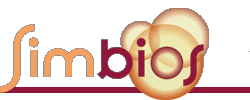|
|
Rapid Molecular Dynamics Prototyping and Simulations on GPUs with OpenMM Simbios invites you to join us at its next Open Molecular Mechanics (OpenMM) workshop. Introduction to OpenMMOpenMM is open-source software that enables molecular dynamics (MD) simulations to be accelerated on high performance computer architectures. It has demonstrated speed ups for both implicit solvent[1] and explicit solvent simulations[2] on graphics processing units (GPUs) (see benchmarks). OpenMM has an application layer that allows non-programmers to easily and quickly run MD simulations and develop custom algorithms on GPUs. It is also a software library, enabling programmers to integrate OpenMM into their own programs. Workshop DescriptionIntended Audience: This workshop is designed for those interested in accelerating MD simulations on GPUs and/or developing new MD algorithms that can automatically be implemented and accelerated on GPUs. No programming background is required, though a programming track will be offered for those who are interested in integrating OpenMM into their code. Flexible Format: A flexible format enables participants to get the most out of the workshop.
Individuals can attend either the instructional portion or the open working portion or both. Schedule
The workshop will be held March 26-29, 2013. Days 1 & 2 of the workshop are instructional. Days 3 & 4 are devoted to working on an individual's research project.
Individuals can attend either the instructional portion or the working portion or both.
The agenda for Days 1 & 2 will be determined by participants' interests and backgrounds. A sample agenda is available here. Workshop Logistics The workshop will be held at Stanford University and is free to attend. However, registration is required and spaces are limited. For questions, please send e-mail to simbiosfeedback@stanford.edu. Preparing for the Workshops For the workshop, attendees are expected to bring their own laptops with the necessary software already installed. Detailed instructions will be sent to participants before the workshops.Additional details (including directions, travel, & lodging info).
|
|



